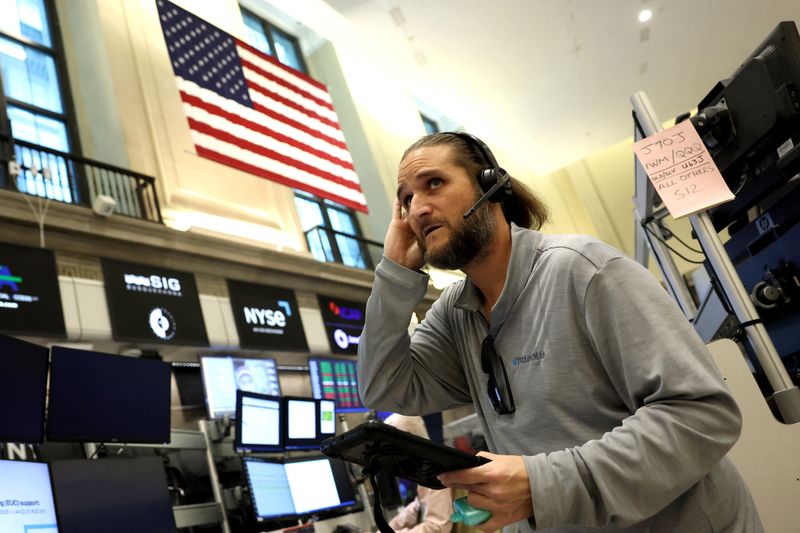By Saqib Iqbal Ahmed
NEW YORK (Reuters) – A relentless rally in U.S. stocks is showing few signs of slowing into year-end, even as rising valuations and signs of excessive speculation fuel worries that a pullback may be overdue.
The S&P 500 notched its 57th record close of the year on Friday and is up nearly 28% in 2024, driven by a robust U.S. economy, expectations of lower interest rates and excitement over the tax cuts and deregulation promised by President-elect Donald Trump.
Strong momentum has been a hallmark of the rally. The S&P 500 has gone over 13 months without straying 10% or more from its record high, the longest such streak in nearly three years. Historically, corrections of 10% or more have occurred once per year on average, data from BofA Global Research showed.
“Momentum is the factor that is driving the market,” said Steve Sosnick, chief strategist at Interactive Brokers (NASDAQ:IBKR). “The market right now is basically a freight train and nobody really wants to get in its way.”
Betting against a market in a strong uptrend has historically been risky: the S&P 500 has logged back-to-back annual gains of 20% or more five times since 1928, and has been higher three months later in each case, with an average gain of 6.3%, according to a Reuters analysis of LSEG data. The index was up 24.2% last year.
“Momentum begets momentum,” said Sonu Varghese, global macro strategist at Carson Group, who is overweight equities.
“You don’t want to fight the tape.”
Still, even some ardent bulls are starting to question whether stocks may be due for a breather.
Bank of America’s Michael Hartnett on Friday noted the S&P 500 was trading at 5.3 times price to book value, exceeding its March 2000 peak, and warned there was a risk of an “overshoot” in the first quarter of 2025. He also nodded to signs of “froth” in the broader markets, including the post-election rally that took bitcoin past $100,000 for the first time ever last week.
The bank has a target of 6,666 on the S&P 500 for next year, more than 9% above where it now trades.
Ed Yardeni, founder of Yardeni Research, cited various measures indicating that sentiment is skewed to the bullish side, including the November Consumer Confidence Index, which showed a record 56.4% of consumers expect stocks to be higher in the next 12 months.
Extremes in sentiment are often viewed as a contrarian indicator because the bar for positive surprises is greater.
“For the here and now, there may be too many charged up bulls,” wrote Yardeni, adding that a near-term pullback would likely be an opportunity for investors to buy on the cheap.
Lori Calvasina, head of U.S. equity research at RBC, said in late November that she had become increasingly concerned that crowded investor positioning and elevated valuations have made the S&P 500 vulnerable to a pullback of between 5% and 10%.
The index currently trades at 22.6 times forward earnings, compared to a historical average of 15.77.
For now, there is little indication those worries are rippling through broader markets. Take the Cboe Volatility Index, which gauges investor demand for protection from market swings. The measure, which hit a four-year high during a violent but brief market shakeout in August, slumped to a near five-month low of 12.75 on Friday.
The history of the VIX index suggests market calm may persist for a while. Once the index closes below the 14 level as it did in late November, it takes an average of 136 trading sessions to climb above the 20 mark – a level associated with moderate levels of market volatility.
Stocks’ historical record of strong December performance may also be boosting investor confidence.
The S&P 500 has generated an average gain of around 1.6% in December and finished the month higher 74% of the time, marking the highest win rate across the calendar, according to an LPL Financial (NASDAQ:LPLA) analysis.
Of course, a market reversal is inevitable at some point. One potential trigger could be volatility sparked by Trump’s threat to impose steep tariffs on U.S. trading partners such as Canada, Mexico and China. Strategists have warned that a full-blown trade war could counteract the positive impact of policies such as tax cuts and deregulation.
But many investors are happy to stay put for the time being.
For Fundstrat Global Advisors’ head of technical strategy, Mark Newton, short-term ‘overbought conditions’ – technical speak for a market that has risen too far, too fast – is not reason enough in itself to exit stocks.
“I just have a difficult time selling the equity market here,” Newton said.

